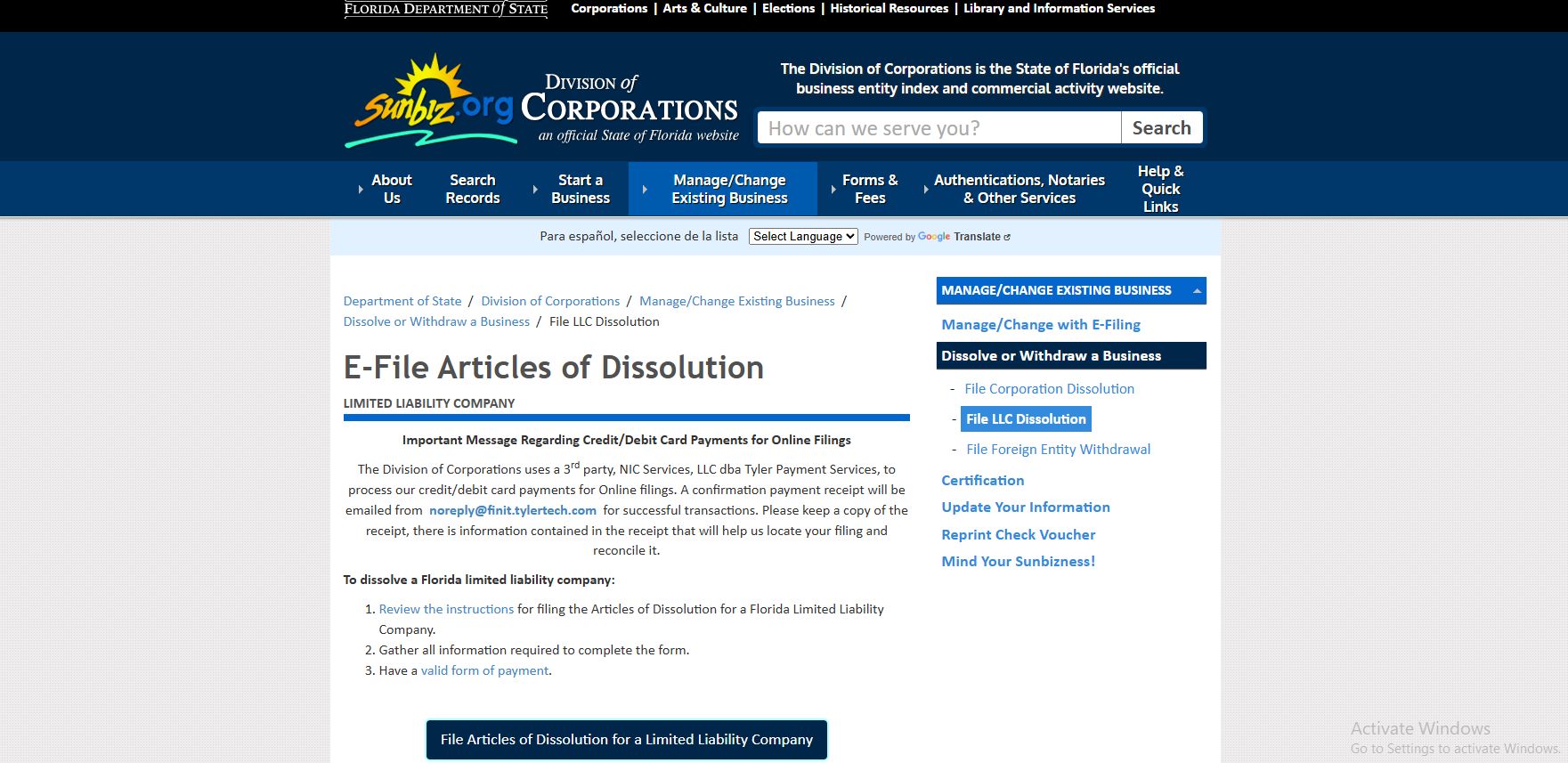Dissolving an LLC in Florida involves officially ending your business’s legal status with the state, which prevents ongoing fees, taxes, and liabilities. Here’s a quick breakdown of the steps:
- Get Member Approval: Secure unanimous consent from all LLC members and document it in writing, as required by Florida law.
- Wind Up Business Operations: Notify creditors, settle debts, distribute remaining assets, and file final tax returns.
- File Articles of Dissolution: Submit the required form to the Florida Division of Corporations with a $25 filing fee.
- Handle Post-Dissolution Tasks: Store records, finalize obligations, and monitor for any remaining liabilities.
Skipping steps can lead to penalties or legal issues. Following this process ensures your LLC is properly dissolved and protects you from future complications.
Step 1: Get Member Approval
Before dissolving your LLC in Florida, you need to secure unanimous approval from all members.
Meeting Consent Requirements
Start by checking your operating agreement for any specific rules about dissolution – this includes voting thresholds, procedures, and how meetings should be arranged. If your operating agreement doesn’t cover dissolution, Florida’s default rules come into play. Under Florida Statute § 605.0701, unanimous consent from all LLC members is required. This means every single member must agree to the dissolution; even one dissenting vote can block the process.
Florida law enforces this unanimous consent requirement whether or not it’s outlined in your operating agreement. Proceeding without full agreement can lead to legal disputes and potentially expensive litigation.
Recording the Decision
Verbal agreements won’t cut it – Florida law and general best practices require that the decision be documented in writing.
Here’s how you can document member approval:
- Option 1: Hold a formal meeting, and record detailed minutes. Include the date, time, attendees, vote count, and any dissenting opinions.
- Option 2: Use a written consent form. This document should clearly state the decision, include the date, and feature original signatures from all members.
The Florida Division of Corporations advises having an attorney review your dissolution documents before submitting them. Additionally, keep multiple copies of these records. They’ll be needed when filing the Articles of Dissolution and should remain part of your LLC’s permanent records, even after the company is dissolved.
Once you’ve properly documented the decision, you’re ready to move forward with wrapping up your LLC’s operations.
Step 2: Wind Up Business Operations
After securing member approval, the next step is to close your LLC’s operations. This includes notifying stakeholders, settling financial obligations, and addressing final tax requirements.
Informing Stakeholders
Start by notifying all creditors, vendors, and business partners about your LLC’s dissolution. Skipping this step could lead to legal complications down the road. Send written notices or emails that clearly state your dissolution date and provide instructions for submitting final invoices or claims. It’s also important to inform employees, customers, and other contacts to preserve professional relationships during this transition. Keep copies of all communications to establish a paper trail that could prove useful if any issues arise later. Once everyone is informed, you can move on to settling debts and distributing assets.
Paying Debts and Distributing Assets
Under Florida Statutes § 605.0710, the LLC’s assets must first be used to settle creditor claims before distributing anything to members.
Florida Statutes § 605.0710 states: "In winding up its activities and affairs, a limited liability company must apply its assets to discharge its obligations to creditors, including members who are creditors."
Begin by paying off creditors or setting aside reserves for outstanding claims. It’s critical to address all debts and obligations before distributing any leftover assets. If funds are insufficient to cover all claims, they should be paid based on their priority. After creditors are satisfied, any remaining assets can be distributed to members, usually in line with the LLC’s operating agreement or based on the proportion of their contributions. If there isn’t enough to fully return member contributions, the remaining funds should be distributed proportionally.
Florida also provides two options for handling claims during dissolution. You can use statutory notice and claim rejection procedures for known and contingent claims to shorten the claims period, or you can simply pay (or make reasonable provisions to pay) all known claims. Once debts are settled and assets are distributed, the final step is to address your LLC’s tax obligations.
Completing Final Tax Requirements
Although Florida doesn’t require businesses to obtain a tax clearance for dissolution, you must still resolve all outstanding state and federal tax obligations. This includes any sales, payroll, or income taxes. Ensure you file final federal and state tax returns following IRS and state guidelines. The IRS offers resources to help businesses close properly, including guidance on reporting income and expenses during the transition. Filing accurate and complete tax documents is essential to avoid penalties or future liabilities.
Once you’ve completed these steps, your LLC will be ready to file the official Articles of Dissolution with the state.
Step 3: File Articles of Dissolution
Once you’ve closed out your business operations and addressed all outstanding debts, the next step is to officially dissolve your LLC with the Florida Division of Corporations. Filing the Articles of Dissolution formally ends your LLC’s existence and removes it from Florida’s active business registry.
Completing the Articles of Dissolution
To get started, gather the necessary details, including your LLC’s legal name, Document Number (available on Sunbiz), the effective date of dissolution (if applicable), and the reason for dissolution (e.g., unanimous member consent). The form must meet the requirements outlined in Florida Statute 605.0707 and must be signed by an authorized LLC member or legal representative. For online submissions, typing your name serves as your signature. It’s a good idea to review the instructions carefully and have a legal professional check your documents. Once everything is ready, decide on your filing method and pay the required fee.
Submission Process and Costs
You can file your Articles of Dissolution either online through the Sunbiz website or by mail. The filing fee is $25, regardless of the method you choose. For online submissions, payment options include major credit cards (Visa, MasterCard, American Express, or Discover), debit cards with Visa or MasterCard logos, or a Prepaid Sunbiz E-File Account. If filing by mail, include a check or money order payable to the Florida Department of State. Processing typically takes about 2–3 business days, after which you can download your Articles of Dissolution at no extra cost. Additional services are available, such as a Certificate of Status for $5 or a certified copy for $30. Be aware that all submitted information becomes part of the public record.
Avoiding Filing Errors
To ensure a smooth process, avoid common mistakes. One frequent error is failing to notify the Florida Department of State by not filing the Articles of Dissolution – letting your annual report lapse does not officially dissolve your LLC. Make sure all obligations, including tax accounts, are resolved to avoid penalties that could delay or block your LLC’s termination. Double-check that every field is completed accurately using your LLC’s registered legal name to prevent rejection.
Lastly, notify all creditors and business partners about the dissolution. Also, clearly document how any remaining assets are distributed among members to help avoid potential disputes down the road.
sbb-itb-ba0a4be
Step 4: Handle Post-Dissolution Tasks
After filing your Articles of Dissolution, the next step is to focus on protecting your personal and financial interests. While the legal closure of your LLC is complete, there are still important post-dissolution tasks to wrap up. These steps are essential to ensure the process is fully finalized and to safeguard against future liabilities.
Storing Records
Keep critical documents – such as dissolution papers, final tax returns, meeting minutes, and financial statements – for at least three to five years. Maintain both physical and digital copies, organizing them by date and category for easy access when needed.
Once your records are securely stored, you can turn your attention to addressing any remaining financial or legal responsibilities.
Watching for Remaining Obligations
Even after dissolution, your former LLC could still face liabilities. Finalize all tax filings and pay off any outstanding debts to avoid complications down the road. Be sure to address any remaining obligations, including releasing personal guarantees tied to business debts. Stay vigilant for unexpected claims or correspondence from creditors, tax authorities, or other parties. Additionally, be aware that businesses marked as delinquent or administratively dissolved may become targets for business identity theft.
Using Business Management Tools
Tools like BusinessAnywhere can simplify post-dissolution tasks by offering features such as secure document storage, compliance tracking, and task automation. Their dashboards, compliance notifications, and 24/7 access help you stay organized and on top of any obligations.
Select a tool that aligns with your needs for secure storage and compliance management. With the right resources, you can efficiently handle post-dissolution responsibilities and protect yourself from potential risks in the future.
Conclusion
Dissolving an LLC in Florida requires careful attention to detail and adherence to state laws. The process includes four key steps: obtaining unanimous member approval, wrapping up business operations (like settling debts and notifying stakeholders), filing the Articles of Dissolution with the Florida Department of State (which involves a $25.00 filing fee), and completing any final post-dissolution tasks. Following this structured process ensures that every aspect of the dissolution is properly handled.
These steps are guided by Florida Statutes §§ 605.0701 et seq., and completing them thoroughly can help avoid future liabilities, taxes, or penalties.
It’s a good idea to have legal counsel review all documents before submission and allow 2–3 business days for processing on Sunbiz. This final review ensures the same level of care as during the approval and operational wind-down stages. Additionally, review your operating agreement and keep records for several years to safeguard against potential legal or financial complications down the road.
FAQs
What happens if all members don’t agree to dissolve an LLC in Florida?
If you try to dissolve an LLC in Florida without getting unanimous approval from all members, you could face some serious problems. Disagreements between members might escalate into legal battles or even require court involvement. On top of that, ignoring the operating agreement or state laws that mandate unanimous consent could leave the LLC – or its members – open to liabilities, making the whole process messier and more expensive. To steer clear of these headaches, make sure everyone is in agreement before moving forward with the dissolution.
How do I notify creditors and settle debts when dissolving an LLC in Florida?
When you’re dissolving an LLC in Florida, it’s important to notify all known creditors about the process and give them clear instructions for submitting claims. This can be done through written notices or emails. Be sure to include key details like the dissolution date, how they can file a claim, and the deadline for submission. This step ensures creditors have a fair chance to respond.
Before wrapping up the dissolution, take the time to settle any outstanding debts and obligations. This might involve paying off liabilities or resolving disputes. Handling these responsibilities properly can help shield your LLC from potential legal or financial complications down the road.
What should I do if unexpected debts or claims arise after dissolving my Florida LLC?
If unexpected debts or claims surface after dissolving your LLC in Florida, it’s crucial to handle them without delay. Even though your LLC is no longer active, you might still be held accountable for any unresolved liabilities from its operational period. Ignoring these debts could, in some cases, expose you to personal liability, particularly if assets were distributed too soon.
To steer clear of such risks, make sure all known creditors are informed and paid before completing the dissolution process. It’s also wise to hold off on distributing any leftover assets until the statute of limitations for potential claims has expired. These precautions can help shield you from legal or financial troubles down the road.









